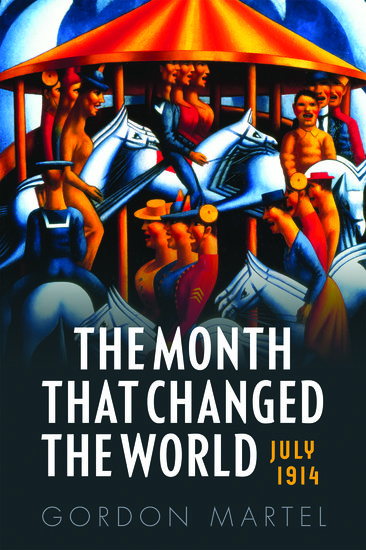July 1914 was the month that changed the world. On 28 June 1914, Archduke Franz Ferdinand was assassinated, and just five weeks later the Great Powers of Europe were at war. But how did it all happen? Historian Gordon Martel, author of The Month That Changed The World: July 1914, is blogging regularly for us over the next few weeks, giving us a week-by-week and day-by-day account of the events that led up to the First World War.
By Gordon Martel
Kaiser Wilhelm received a copy of the Serbian reply to the Austrian demands in the morning. Reading it over, he concluded that the Habsburg monarchy had achieved its aims and that the few points Serbia objected to could be settled by negotiation. Their submission represented a humiliating capitulation, and with it ‘every cause for war’ collapsed. A diplomatic solution to the crisis was now clearly within sight. Austria-Hungary would emerge triumphant: the Serbian reply represented ‘a great moral success for Vienna’.
In order to assure Austria’s success, to turn the ‘beautiful promises’ of the Serbs into facts, the Kaiser proposed that Belgrade should be taken and held hostage by Austria. ‘The Serbs,’ he pointed out, ‘are Orientals, and therefore liars, fakers and masters of evasion.’ An occupation of Belgrade would guarantee that the Serbs would carry out their promises while satisfying satisfying the honour of the Austro-Hungarian army. On this basis the Kaiser was willing to ‘mediate’ with Austria in order to preserve European peace.
In Vienna that morning the German ambassador was instructed to explain that Germany could not continue to reject every proposal for mediation. To do so was to risk being seen as the instigator of the war and being held responsible by the whole world for the conflagration that would follow.
Berchtold began to worry that German support was about to evaporate. He responded by getting the emperor to agree to issue a declaration of war on Serbia just before noon. For the first time in history war was declared by the sending of a telegram.

The German chancellor undertook a new initiative to place the responsibility for a European war on Russia: he encouraged Kaiser to write directly to the Tsar, to appeal to his monarchical sensibilities. Such a telegram would ‘throw the clearest light on Russia’s responsibility’. At the same time he rejected Sir Edward Grey’s proposal for a conference in London in favour of ‘mediation efforts’ at St Petersburg, and trusted that his ambassador in London could get Grey ‘to see our point of view’.
At the Foreign Office in London they were skeptical. Officials concluded that the Austrians were determined to find the Serbian reply unsatisfactory, that if Austria demanded absolute compliance with its ultimatum ‘it can only mean that she wants a war’. What Austria was demanding amounted to a protectorate. Grey denied the German complaint that he was proposing an ‘arbitration’ – what he was suggesting was a ‘private and informal discussion’ that might lead to suggestion for settlement. But he agreed to suspend his proposal as long as there was a chance that the ‘bilateral’ Austro-Russian talks might succeed.
The news that Austria-Hungary had declared war on Serbia reached Sazonov in St Petersburg late that afternoon. He immediately arranged to meet with the Tsar at the Peterhof. After their meeting the foreign minister instructed the Russian chief of the general staff to draft two ukazes – one for partial mobilization of the four military districts of Odessa, Kiev, Moscow and Kazan, another for general mobilization. But the Tsar, who remained steadfast in his determination to do nothing that might antagonize Germany, would go no further than authorize a partial mobilization aimed at Austria-Hungary. He did so in spite of the warnings from his military advisers who told him that such a mobilization was impossible: a partial mobilization would result in chaos, make it impossible to prosecute a successful war against Austria-Hungary and render Russia vulnerable in a war with Germany.
A partial mobilization would, however, serve the requirements of Russian diplomacy. Sazonov attempted to placate the Germans by assuring them that the decision to mobilize in only the four districts indicated that Russia had no intention of attacking them. Keeping the door open for negotiations, he decided not to recall the Russian ambassador from Vienna – in spite of Austria’s declaration of war on Serbia. Perhaps there was still time for the bilateral talks in St Petersburg to save the situation.
That night Belgrade was bombarded by Austro-Hungarian artillery: two shells exploded in a school, one at the Grand Hotel, others at cafés and banks. Offices, hotels, and banks had been closed. The city had been left defenceless.
Gordon Martel is a leading authority on war, empire, and diplomacy in the modern age. His numerous publications include studies of the origins of the first and second world wars, modern imperialism, and the nature of diplomacy. A founding editor of The International History Review, he has taught at a number of Canadian universities, and has been a visiting professor or fellow in England, Ireland and Australia. Editor-in-chief of the five-volume Encyclopedia of War, he is also joint editor of the longstanding Seminar Studies in History series. His new book is The Month That Changed The World: July 1914.
Subscribe to the OUPblog via email or RSS.
Subscribe to only history articles on the OUPblog via email or RSS.


Recent Comments
There are currently no comments.